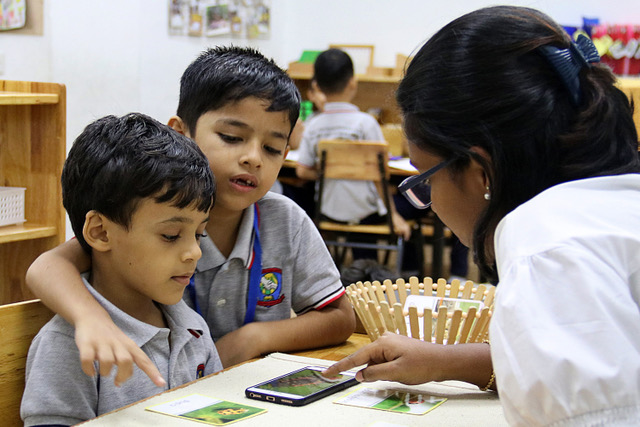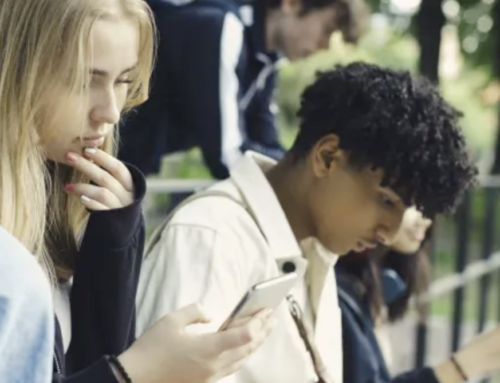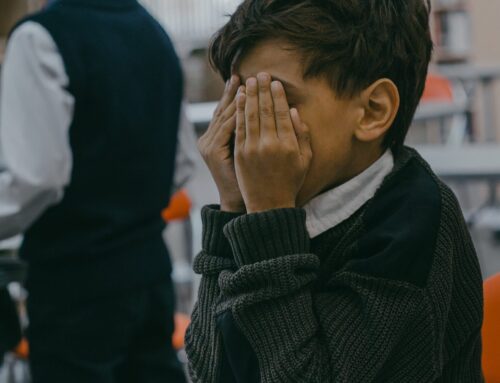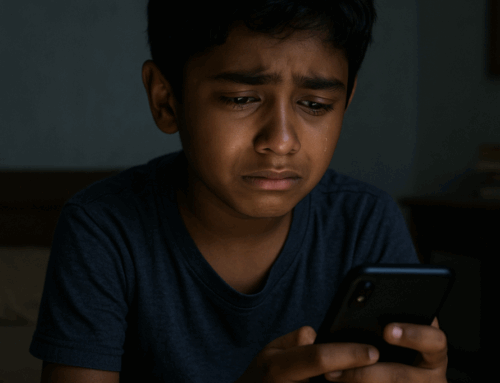Natalie Tan at the Dignity School in Kuala Lumpur explains to Nicholas Carlisle how young refugee children use their smartphones to stay in touch with their parents and protect each other from capture. She also talks about the impact of pornography and the exhaustion of students who spend all night gaming. 80% of the children in the school are from other countries, the majority are undocumented refugees or seeking asylum.
Thank you for showing me around your school. I was so impressed by your Montessori program for the early years called Formative Education. Do your younger students here go online?
We don’t allow the children to bring smartphones or tablets in the classroom. Outside school I see many of our young students using headphones to watch videos on their phones. This is not only our refugee students. When I go into restaurants in Malaysia I often see parents pacifying their younger children with hand phones or tablets.
In urban spaces you have to go and play on the street. It’s very hot outside and dusty which makes it hard to play. You might as well stay indoors and use the phone. I have seen many kids under the age of eight play video games all day long.
One of our eight year old students spent the holidays sitting under the table, lying on a mat and playing video games all day long. Six hours every day shooting people. He starting repeating all these English curse words. I don’t know if his mother did not understand that these were curse words – his parents never said to her “Read a book”. Eventually one of the teachers called me and begged me to do something.
Are parents concerned about what their kids are doing online?
A lot of our parents don’t speak English. It’s very easy for the children to manipulate or lie to them about what they are doing. Most of the time the parents think they are on Facebook or watching a movie or playing games. They know they should be studying but they don’t do anything to stop them.
Sometimes parents of older kids come to us and complain about how their son is performing at school.“My son is not doing so well in their studies. Why are you not doing anything about it.” When we ask “Well what does your son do at home?” “Ah, yes”, they say “he spends a lot of time with playing games online or watching videos.” But they don’t make the connection between this and his performance at school.
Often one or both of their parents are working. Our families tend to live together and choose one of the mothers to stay at home and take care of all the children so that the rest can go out and work. So they really don’t have the time to wonder what their kids are doing. They don’t address the big issues with their children such as online bullying or pornography use.
It’s courageous of you to mention pornography. Many teachers prefer never to talk about this, though the evidence is that children around the world have far greater exposure than we like to acknowledge. What’s your sense of online pornography used by students here in Malaysia?
I am certain that almost every single male child in our secondary school has watched pornography or at least engaged with it. The boys share it among themselves. They sometimes use our school computers and they don’t understand how to hide their history. So we see what they are doing.
We take the time to sit down with the boys when they are 13 or 14 years old and talk about it. Even our female Principal sat down with a group of boys and confronted them on their pornography use. Our pastor asked a group of boys to reflect on how they think about the girls [that they see online]. How would you feel if someone thought about your mother or your sister in this way? A lot of them had never made this comparison or connection and they were utterly shocked. Then he said to them, “These are someone’s children. They have parents and they have siblings just like you. What makes you think these people are not human too?” We should start talking about this earlier. Kids start watching pornography really young.
Do your teachers have concerns about their students use of smart phones and tablets?
They talk about it quite a bit. Students are using their phones so much at night that they don’t get enough sleep. They come to school and by 10 o’clock in the morning they are exhausted. Then when we dig and ask they tell us why. They say that they have been up all night playing a game. They do not have parents who are monitoring them. It makes them unfit to study.
The other thing that concerns our teachers is pornography. In countries like this with a very strong patriarchy and a belief system that women should serve men, the impact of pornography is even worse. Many of the boy students come in and tell us that they don’t sweep the floor and only women should sweep the floor and cook and clean. If we ask the boys to pass a note the teacher they will say “Hey, Fatima, why don’t you do it?” Their sense of ordering girls about is so ingrained. Pornography objectifies women and I worry that this is reinforcing their gender attitudes.
Every year we have a peace camp, which is attached to our football program. We use sports as a way to talk about gender and race. Our girls start playing football as young as eight. We play three days of football and use the time to talk about gender roles and how boys and girls should treat each other.
I remember you mentioned that smart phones are especially important for refugee students.
It is very common for our parents to leave their child in the care of another community member and seek a job in another country. So their phone is going to be the main way that they call their kid and catch up with them.
For our refugee students smart phones are a safety tool. A lot of things happen to them – raids, arrests – and their phone is their main point of communicating with the rest of the community. We had a student who was caught by immigration. He called people here who were refugees and they knew then that they should not come out of the building in case they were also arrested.
When you look at the children in your school, what’s your biggest concern about their use of phones?
The Internet fundamentally alters the way that kids relate to each other and build relationships and fall into love, get into relationships and get out of relationships. On Instagram and snapchat it’s so easy to compare your lives with others. And it is so easy to hide relationships if you are having the relationship online.
As a teacher, I think of all the precious time when they could be doing something else, instead of watching videos and the other senses they could be engaging. Because of the way everything is set up online, everything is on auto-play. They can go on watching for hours. If you leave a child and come back two hours later they will still be there watching videos, and they have probably watched 30 YouTube videos in that time. I don’t know the actual science but I can’t imagine it’s very good for the eyes or their brains.







Leave A Comment